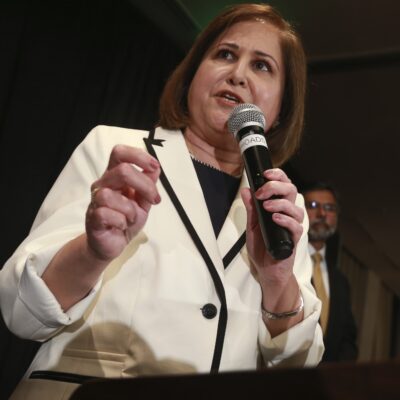Erekat Slams Trump Admin’s Handling of Recent Crisis
Chief Palestinian negotiator Saeb Erekat criticized the Trump administration’s mediation efforts in the ongoing Israeli-Palestinian conflict. During an exclusive interview with Jewish Insider on Sunday, Erekat complained specifically about the U.S. response to the recent Temple Mount crisis. “We don’t understand how no U.S. officials came out with any word of sympathy for the Palestinian people that have been attacked and killed by occupation forces, including settlers,” he declared.
President Trump’s Middle East envoy Jason Greenblatt condemned the July 21 murder of three Israelis in their Halamish home by a Palestinian terrorist. Erekat’s complaint, however, focused on the White House’s silence over the death of several Palestinian protesters the past two weeks. On July 21, three Palestinians were killed in street clashes with Israeli forces and although Palestinian media reported that a settler killed one Palestinian on July 21, that has not been confirmed by the Israeli government.
Last week, following the decision by Israel’s cabinet to remove the metal detectors outside the Temple Mount — after a week of deadly violence — White House Press Secretary Sarah Huckabee Sanders noted, “The United States applauds the efforts of Israel to maintain security while reducing tensions in the region.”
“There are things that we can’t understand, such as having an ambassador to the UN that is willing to block the appointment of any Palestinian at the organization,” Erekat said. “Israel announces thousands of new settlement units that make it almost impossible to achieve the two-state solution, and it’s merely met with silence from U.S. officials.”
Responding to Erekat’s criticism, a senior White House official told Jewish Insider, “As tensions in the region continue to lower, rhetoric like this is neither valid nor helpful towards everyone’s ultimate goal of achieving peace.”
Erekat’s remarks represent the highest level criticism from the Palestinian Authority of the Trump administration since February. In prior months, possibly to earn favor with the new administration, Palestinian Authority officials have repeatedly praised Trump, calling his presidency “a historic opportunity” to reach a peace deal.
While President Trump has met with both Israeli Prime Minister Benjamin Netanyahu and Palestinian President Mahmoud Abbas twice, along with numerous visits by Greenblatt to Jerusalem and Ramallah, Erekat insisted that “so far we cannot claim that any tangible progress has been achieved.”
“We would like to simply hear from the U.S. administration things we have heard before such as a reaffirmation that the endgame is to end the occupation that began in 1967, a support for the two-state solution on the 1967 borders, the Madrid Principles or that they endorse the Arab Peace Initiative,” Erekat added. At the same time, he asserted that Ramallah is still invested in the Trump administration-led talks. “We remain committed, but we do have differences that they know about.”
According to media reports, Erekat is in need of a lung transplant. Given his difficult medical condition, the veteran Palestinian official has offered far fewer media engagements in recent months and conducted this interview via email.
Regarding the Taylor Force Act — legislation that would sever U.S. economic aid to the PA unless they end payments to families of terrorists — Erekat said the PLO’s view is “obviously not a positive one, but several U.S. congressmen have to decide whether it serves its national interest or not. We have been open and willing to talk to every member of the U.S. Congress in order for them to listen to our positions.”
Lowering expectations of the Greenblatt-led process, Erekat noted, “I couldn’t claim that we’ve had any kind of negotiations yet. We’ve had several meetings, discussed several issues, but we couldn’t claim this is a negotiation process.” When asked about the Palestinian’s Plan B if the Trump led talks failed, the Palestinian chief negotiator said, “I can simply say that we will continue to exist and to struggle for our rights. We’re not going anywhere.”






